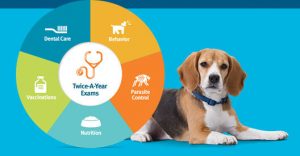Listen to this post |
In my last post, I discussed the dramatic rise in cancer in pets in past 10 years, as well as some of the proposed reasons for it. In this post, I would like to focus on one particular study that provides a potentially profound yet simple way that we may decrease the incidence of cancer in dogs. If you have not yet read my last post, here it is:
Per my last post, the processing of food and the subsequent creation of glycotoxins in processed diets that have an oxidant effect on the body. Oxidants create oxidative stress to tissues and serve to some degree to negate dietary antioxidants that are known to boost the immune system and prevent cancer.
However, home prepared diets are not necessarily the solution to this issue, as it can be very challenging to properly nutritionally balance a home prepared diet, leading to nutrient deficiencies that can lead to a host of disease, including cancer. Dr. Rob Silver, a cutting edge integrative veterinary practitioner and researcher at Colorado State University cited a recent study that may solve this dietary conundrum.
Scottish Terriers as a breed are statistically more prone to urinary bladder cancer (called transitional cell carcinoma – called TCC). As such, they were chosen for a study that compared three test groups:
1.) Dogs fed only a reputable kibble diet.
2.) Dogs fed a reputable kibble diet with green leafy vegetables added to it.
3.) Home prepared diets with no kibble.
The study was quite revealing. The Scottish Terriers in the second group that were fed kibble with the addition of green leafy vegetables were 70% – 90% less likely to develop TCC in comparison to groups 1 and 3 that were fed pure kibble and home prepared diets with no kibble, respectively.
The conclusions of this study are very clear from my view:
- There are additional factors outside of genetic predisposition that determine whether or not a dog will develop cancer, as clearly genetic predilection can be affected one way or another by other factors, in this case nutrition.
- Home prepared diets, likely due to the challenges of balancing them from a nutrient perspective, are not necessarily the answer to dietary cancer prevention in dogs.
- Feeding kibble provides nutrient balance, but a neutralizing effect of glycotoxins by the addition of antioxidant rich green leafy vegetables may profoundly prevent cancer, providing us the ability to proverbially have our cake and eat it too.
Regarding green vegetables that are among the highest in antioxidants, two optimal choices for addition to kibble diets are spinach, kale and broccoli. You would generally want to include as close to 20% of total feeding volume represented as vegetables as the dog will still readily eat.
Dr. Roger Welton is a practicing veterinarian and highly regarded media personality through a number of topics and platforms. In addition to being passionate about integrative veterinary medicine for which he is a nationally renowned expert, Dr. Welton was also an accomplished college lacrosse player and remains to this day very involved in the sport. He is president of Maybeck Animal Hospital , runs the successful veterinary/animal health blogs Web-DVM and Dr. Roger’s Holistic Veterinary Care, and fulfills his passion for lacrosse through his lacrosse and sport blog, The Creator’s Game.




